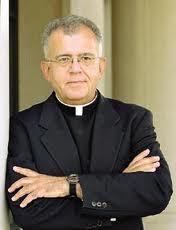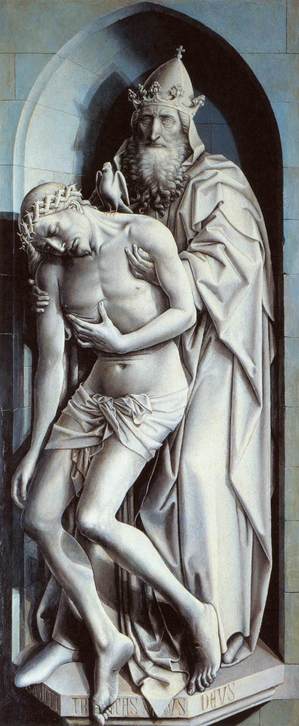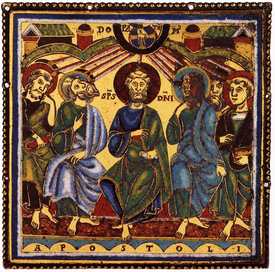
For those who think that the Catholic Church, orthodox Catholic theology, the Pope, or any right-thinking Catholic person in the 21st century is against science: think again. Take your head out of the sand; do some reading. Today, His Holiness address the distinguished members of the Pontifical Academy of Sciences meeting for their plenary assembly. The theme they've chosen to explore is "The Scientific Legacy of the Twentieth Century."
Two papal hopes for future scientists: "the need for an interdisciplinary approach tied with philosophical reflection" and that the work of science "always be informed by the imperatives of fraternity and peace, helping to solve the great problems of humanity, and directing everyone's efforts towards the true good of man and the integral development of the peoples of the world."
Benedict addressed the following text to 80 scientists:
The history of science in the twentieth century is one of undoubted achievement and major advances. Unfortunately, the popular image of twentieth-century science is sometimes characterized otherwise, in two extreme ways. On the one hand, science is posited by some as a panacea, proven by its notable achievements in the last century. Its innumerable advances were in fact so encompassing and so rapid that they seemed to confirm the point of view that science might answer all the questions of man's existence, and even of his highest aspirations. On the other hand, there are those who fear science and who distance themselves from it, because of sobering developments such as the construction and terrifying use of nuclear weapons.
Science, of course, is not defined by either of these extremes. Its task was and remains a patient yet passionate search for the truth about the cosmos, about nature and about the constitution of the human being. In this search, there have been many successes and failures, triumphs and setbacks. The developments of science have been both uplifting, as when the complexity of nature and its phenomena were discovered, exceeding our expectations, and humbling, as when some of the theories we thought might have explained those phenomena once and for all proved only partial. Nonetheless, even provisional results constitute a real contribution to unveiling the correspondence between the intellect and natural realities, on which later generations may build further.
The progress made in scientific knowledge in the twentieth century, in all its various disciplines, has led to a greatly improved awareness of the place that man and this planet occupy in the universe. In all sciences, the common denominator continues to be the notion of experimentation as an organized method for observing nature. In the last century, man certainly made more progress - if not always in his knowledge of himself and of God, then certainly in his knowledge of the macro- and microcosms - than in the entire previous history of humanity. Our meeting here today, dear friends, is a proof of the Church's esteem for ongoing scientific research and of her gratitude for scientific endeavour, which she both encourages and benefits from. In our own day, scientists themselves appreciate more and more the need to be open to philosophy if they are to discover the logical and epistemological foundation for their methodology and their conclusions. For her part, the Church is convinced that scientific activity ultimately benefits from the recognition of man's spiritual dimension and his quest for ultimate answers that allow for the acknowledgement of a world existing independently from us, which we do not fully understand and which we can only comprehend in so far as we grasp its inherent logic. Scientists do not create the world; they learn about it and attempt to imitate it, following the laws and intelligibility that nature manifests to us. The scientist's experience as a human being is therefore that of perceiving a constant, a law, a logos that he has not created but that he has instead observed: in fact, it leads us to admit the existence of an all-powerful Reason, which is other than that of man, and which sustains the world. This is the meeting point between the natural sciences and religion. As a result, science becomes a place of dialogue, a meeting between man and nature and, potentially, even between man and his Creator.
As we look to the twenty-first century, I would like to
propose two thoughts for further reflection. First, as increasing
accomplishments of the sciences deepen our wonder of the complexity of nature,
the need for an interdisciplinary approach tied with philosophical reflection
leading to a synthesis is more and more perceived. Secondly, scientific
achievement in this new century should always be informed by the imperatives of
fraternity and peace, helping to solve the great problems of humanity, and
directing everyone's efforts towards the true good of man and the integral
development of the peoples of the world. The positive outcome of twenty-first
century science will surely depend in large measure on the scientist's ability
to search for truth and apply discoveries in a way that goes hand in hand with
the search for what is just and good.




